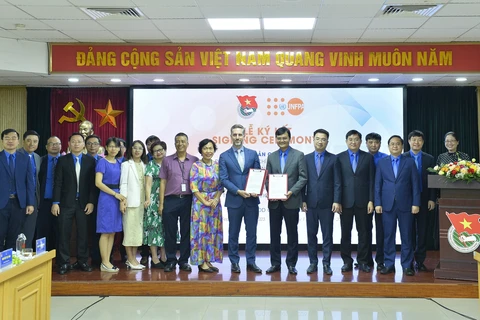Hanoi (VNA) - The Seventh Asian and Pacific Population Conference, being held in Bangkok, Thailand, from 15-17 November, 2023, is a great opportunity for governments, civil society, young people and others come together, building on their collective investments and planning new initiatives for a prosperous and sustainable future.
Representatives from Vietnam’s Ministry of Planning and Investment, Ministry of Health and Youth Union have joined the event and contributing to the useful discussion. On this occasion, Vietnam News Agency speaks to UNFPA Representative in Vietnam Matt Jackson about the health care situation in Vietnam and population challenges facing the country.
Reporter: What are your evaluations of the progress Vietnam has achieved in terms of health care, including SRH towards sustainable development?
Matt Jackson: First of all, I would like to take this opportunity to congratulate the Government of Vietnam for its remarkable progress towards achieving SDGs as stated in its Voluntary National Review 2023 on the implementation of the sustainable development goals. The Government is demonstrating strong political commitment to the 2030 Agenda of Leaving No One Behind.
In terms of sexual and reproductive health and rights, Vietnam was one of only 9 countries in the world that achieved the maternal mortality reduction target in the Millennium Development Goals. This is a good success story; however, disparities remain. While the maternal mortality ratio (MMR) has declined from 233 per 100,000 live births in 1990’s to 46 per 100,000 live births in 2020, it is 2-3 times higher among ethnic minorities. Unmet need for family planning is 40% among unmarried young people, considerably higher than the national average of 10%. Young people still lack adequate and comprehensive information and services, and the situation is accentuated among ethnic minorities and persons with disabilities.
The International Conference on Population and Development (ICPD), held in 1994 in Cairo, saw over 170 countries come together to affirm that everyone has the right to enjoy sexual and reproductive health through commit universal access to sexual and reproductive health services.
This week sees the 7th Asia Pacific Conference on Population and Development where countries in the Asia-Pacific region will review progress on ICPD and prepare for the 30th anniversary in 2024. UNFPA is calling on policymakers and community leaders to prioritise women’s and girls’ choices and access to safe and effective contraceptives and information to ensure that every young person has the means and tools to avoid unintended pregnancies and sexually transmitted infections, and to build the life-skills necessary for adulthood and older age.
Reporter: What are the population challenges in Vietnam? How have these challenges affected the implementation of sustainable development in Vietnam?
Matt Jackson: Like many other countries in Asia and the Pacific, Vietnam is experiencing rapid demographic and social change. The country’s total population has increased from 32.6 million in 1960 to 100 million in 2023 making it the 15th most populous country in the world. Demographic trends provide a positive outlook for sustaining socio-economic development. The population of working age has grown to twice that of the dependent population (below 15 and 65 ) providing a large pool of labour. However, the demographic window is projected to close by 2039 suggesting that the need for investment in education and training and the promotion of the rights of women and youth, require attention.
In addition, Vietnam is also one of the most rapidly ageing countries worldwide. It is projected that the country's transition from “population ageing” to “aged population” is much shorter than other countries and will happen by 2036. The continuous increase in both absolute numbers and the percentage of those of advanced age (75 and above) should increase our focus on issues such as the demand for social care, health care, and financial resources. Older people are living longer, healthier lives – and that’s a great success. Yet many older people also face chronic diseases, disabilities and mental health problems. These lead to an increase in healthcare costs and require well-established long-term care systems. This presents both challenges and opportunities that this week’s population conference will discuss with the aim of ensuring people-centred policies./.
Representatives from Vietnam’s Ministry of Planning and Investment, Ministry of Health and Youth Union have joined the event and contributing to the useful discussion. On this occasion, Vietnam News Agency speaks to UNFPA Representative in Vietnam Matt Jackson about the health care situation in Vietnam and population challenges facing the country.
Reporter: What are your evaluations of the progress Vietnam has achieved in terms of health care, including SRH towards sustainable development?
Matt Jackson: First of all, I would like to take this opportunity to congratulate the Government of Vietnam for its remarkable progress towards achieving SDGs as stated in its Voluntary National Review 2023 on the implementation of the sustainable development goals. The Government is demonstrating strong political commitment to the 2030 Agenda of Leaving No One Behind.
In terms of sexual and reproductive health and rights, Vietnam was one of only 9 countries in the world that achieved the maternal mortality reduction target in the Millennium Development Goals. This is a good success story; however, disparities remain. While the maternal mortality ratio (MMR) has declined from 233 per 100,000 live births in 1990’s to 46 per 100,000 live births in 2020, it is 2-3 times higher among ethnic minorities. Unmet need for family planning is 40% among unmarried young people, considerably higher than the national average of 10%. Young people still lack adequate and comprehensive information and services, and the situation is accentuated among ethnic minorities and persons with disabilities.
The International Conference on Population and Development (ICPD), held in 1994 in Cairo, saw over 170 countries come together to affirm that everyone has the right to enjoy sexual and reproductive health through commit universal access to sexual and reproductive health services.
This week sees the 7th Asia Pacific Conference on Population and Development where countries in the Asia-Pacific region will review progress on ICPD and prepare for the 30th anniversary in 2024. UNFPA is calling on policymakers and community leaders to prioritise women’s and girls’ choices and access to safe and effective contraceptives and information to ensure that every young person has the means and tools to avoid unintended pregnancies and sexually transmitted infections, and to build the life-skills necessary for adulthood and older age.
Reporter: What are the population challenges in Vietnam? How have these challenges affected the implementation of sustainable development in Vietnam?
Matt Jackson: Like many other countries in Asia and the Pacific, Vietnam is experiencing rapid demographic and social change. The country’s total population has increased from 32.6 million in 1960 to 100 million in 2023 making it the 15th most populous country in the world. Demographic trends provide a positive outlook for sustaining socio-economic development. The population of working age has grown to twice that of the dependent population (below 15 and 65 ) providing a large pool of labour. However, the demographic window is projected to close by 2039 suggesting that the need for investment in education and training and the promotion of the rights of women and youth, require attention.
In addition, Vietnam is also one of the most rapidly ageing countries worldwide. It is projected that the country's transition from “population ageing” to “aged population” is much shorter than other countries and will happen by 2036. The continuous increase in both absolute numbers and the percentage of those of advanced age (75 and above) should increase our focus on issues such as the demand for social care, health care, and financial resources. Older people are living longer, healthier lives – and that’s a great success. Yet many older people also face chronic diseases, disabilities and mental health problems. These lead to an increase in healthcare costs and require well-established long-term care systems. This presents both challenges and opportunities that this week’s population conference will discuss with the aim of ensuring people-centred policies./.
VNA

























